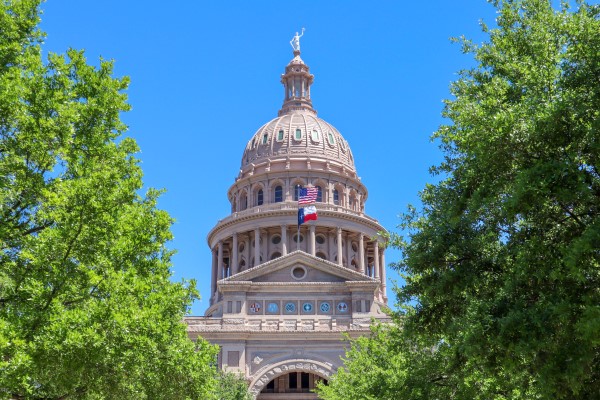Legislative Session Update: Week 10
Published Mar 15, 2019 by Taylor Landin
During the 86th Legislative Session, the Partnership will provide a weekly update on our top executive priorities and other newsworthy items from Austin.
Public school finance reform dominated the Capitol this week as the House Public Education Committee heard public testimony on House Bill 3. While issues related to teachers’ pay and other funding elements need further clarification, the feedback from the public was overwhelmingly positive. In the Senate, the Committee on Water & Rural Affairs took action on the Partnership’s other top executive priority, flood resilience, by unanimously passing a flood planning, recovery, and resilience three-bill package out of the committee. The package now moves to the full Senate for a vote. Finally, the Senate also took a key step forward on Harvey recovery and the 86th Legislative Session budget process by approving the supplemental appropriations budget bill, Senate Bill 500.
PARTNERSHIP EXECUTIVE PRIORITIES
SCHOOL FINANCE REFORM
The House Public Education Committee met on Tuesday to consider House Bill 3, the House school finance legislation by Chairman Dan Huberty (R- Kingwood). The Partnership expressed our full support for HB 3 in written testimony to the committee. Over the twelve hours of public testimony, members of the committee heard presentations on key issues related to an increase in pay for high-performing teachers and a substantial increase to base funding for schools. We expect Chairman Huberty to offer a committee substitute next week that will include several enhancements to the legislation though the majority of the bill should remain intact.
Late last Friday in the Senate, Education Committee Chairman Larry Taylor (R-Friendswood) filed school finance legislation. Senate Bill 4 includes important recommendations from the Texas Commission on Public School Finance including funding that incentivizes schools districts to focus on third grade reading proficiency and college, career and military readiness. Similar to HB 3, the bill allocates funding for students with dyslexia, adjusts funding for transportation costs, provides additional funding for full-day Pre-K for economically disadvantaged students and includes a provision for a teacher pay increase if the teacher transfers to a low-performing or predominantly economically disadvantaged campus. However, the bill does not clearly define funding amounts. We expect a committee substitute in the coming weeks to formalize those figures.
FLOOD RESILIENCE
On Monday, the Senate Committee on Water and Rural Affairs heard Senate Bills 6, 7 and 8, authored by Senators Lois Kolkhorst (R-Brenham), Brandon Creighton (R-Conroe) and Charles Perry (R-Lubbock), respectively. As discussed last week, SB 6 creates a comprehensive approach to disaster preparedness and response, SB 7 creates the Texas Infrastructure Resiliency Fund to fund future flood mitigation projects and address existing local recovery needs, and SB 8 establishes the state’s first statewide flood plan. Taylor Landin, the Partnership’s SVP Public Policy, testified before the committee in support of all three bills. A number of Partnership members and business groups around the state supported the bill, demonstrating widespread support for the statewide package. All three bills passed unanimously out of committee and are scheduled to be heard before the full Senate next week. The quick movement on these three bills as a package reflects the leadership of Senators Creighton, Perry, Kolkhorst and Lt. Governor Dan Patrick on these issues. It also indicates the willingness of the Legislature to play a meaningful role in future flood mitigation, a role traditionally reserved for federal and local governments.
The three bills are accompanied by the Senate supplemental appropriations bill, Senate Bill 500, authored by Senate Finance Committee Chairwoman Jane Nelson (R-Flower Mound), which contains approximately $3 billion from the Economic Stabilization Fund for Hurricane Harvey recovery and statewide flood mitigation and planning. This includes $1.8 billion for the Texas Infrastructure Resiliency Fund (created by SB 7) along with dam infrastructure and another $1.2 billion for state agency expenses and shortfalls related to Hurricane Harvey.
In total, SB 500 utilizes $1.7 billion in general revenue funds and $4.3 billion from the Economic Stabilization Fund to cover budget gaps in the current fiscal biennium. In addition to the Hurricane Harvey related disaster recovery costs mentioned above, the Senate allocated another $900 million for school districts damaged by Hurricane Harvey. The University of Houston would also receive $26.1 million and Lone Star College would receive $13.1 million to cover unanticipated repair and recovery expenses incurred as a result of the storm.
SB 500 passed unanimously out of the Senate on Wednesday and is scheduled to be heard by the House Appropriations Committee on Monday.
Stay up-to-date with our Policy Team throughout the 86th Legislative Session by opting-in to this weekly update or follow the team on Twitter @GHP_Policy
 The Houston Report
The Houston Report


















